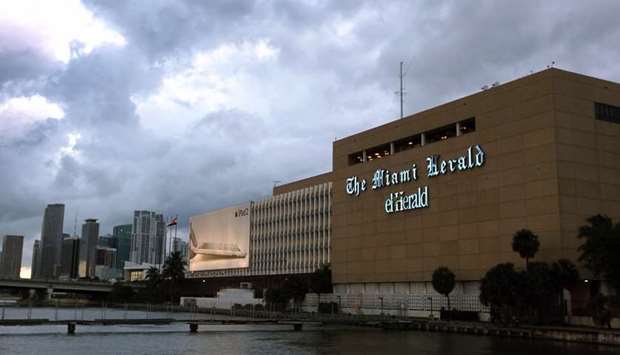McClatchy, the second largest US newspaper group, announced yesterday that it is filing for bankruptcy protection in the latest sign of turmoil for the struggling media sector.
The company said it would keep operating its 30 regional newspapers – including the Miami Herald and Kansas City Star – as it seeks to shed much of its debt and focus on “digital transformation”.
A reorganisation plan included in the bankruptcy filing could hand over ownership of the newspaper chain to the private equity group Chatham Asset Management and end the McClatchy stock listing.
The bankruptcy filing seeks to shed some of the crushing debt acquired by McClatchy, which has a pension shortfall of more than $500mn.
The company said its newsrooms “are operating as usual” and that it had obtained $50mn in bankruptcy financing from Encina Business Credit.
“McClatchy remains a strong operating company with an enduring commitment to independent journalism that spans five generations of my family,’’ said board chairman Kevin McClatchy. “This restructuring is a necessary and positive step forward for the business.”
The move comes amid deepening turmoil in the newspaper industry, with most of the “legacy” companies struggling with the shift to digital news and tech platforms taking up much of the online advertising revenues.
Gannett, the largest US newspaper publisher, agreed last year to a merger with rival GateHouse in a deal aiming for bigger scale to face the challenges of the troubled sector.
Some former prestigious dailies have faced bankruptcy and others have seen the value of their companies drop precipitously.
An estimated 2,000 local US newspapers, most of them weeklies, have disappeared over the past decade as have about half of newspaper jobs, according to various studies.
Craig Forman, McClatchy’s president and chief executive, expressed optimism that the company can keep its journalistic traditions after reorganising.
“In this important moment for independent local journalism in the public interest, a reorganised capital structure will enable McClatchy to continue to pursue our strategy of digital transformation and continue to produce strong local journalism essential to the communities we serve,” Forman said.
The McClatchy papers have won numerous awards but the company has been saddled in debt, which has increased with its 2006 acquisition of rival Knight-Ridder for $4.5bn.
Dan Kennedy, a journalism professor at Northeastern University who follows the sector, said that McClatchy’s woes follow “the narrative that we’ve seen with corporate chain ownership” by accumulating debt that kept it from investing in future technologies.
“I’ve been arguing for quite some time that the very real challenges that newspapers face from social media and the decline of advertising would seem far less onerous without the corporate imperatives of the need to satisfy shareholders and to pay down debt,” Kennedy said.
“It’s too bad that McClatchy can’t just disappear. Freed to pursue their own futures, many of its newspapers might find committed local owners who would reinvest in them and put them on a path to a sustainable future.”
The McClatchy reorganisation plan would need court approval, and the company acknowledged it was still in discussions with its creditors including the Pension Benefit Guarantee Corporation, the government’s insurer for pension funds.
A McClatchy News report said the company was seeking to shed 60% of its pension debt from a fund that covers some 24,500 current employees and retirees, including press workers and delivery drivers, and is now supported by fewer than 2,800 active workers.

This file photo shows the Miami Herald building, owned by newspaper publisher McClatchy Company, in Miami. McClatchy, the second largest US newspaper group, announced yesterday that it is filing for bankruptcy protection in the latest sign of turmoil for the struggling media sector.
